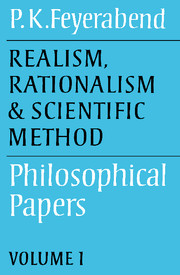Book contents
- Frontmatter
- Contents
- Introduction to volumes 1 and 2
- PART I ON THE INTERPRETATION OF SCIENTIFIC THEORIES
- PART 2 APPLICATIONS AND CRITICISMS
- 8 Introduction: proliferation and realism as methodological principles
- 9 Linguistic arguments and scientific method
- 10 Materialism and the mind–body problem
- 11 Realism and instrumentalism
- 12 A note on the problem of induction
- 13 On the quantum theory of measurement
- 14 Professor Bohm's philosophy of nature
- 15 Reichenbach's interpretation of quantum mechanics
- 16 Niels Bohr's world view
- 17 Hidden variables and the argument of Einstein, Podolsky and Rosen
- Sources
- Name index
- Subject index
9 - Linguistic arguments and scientific method
Published online by Cambridge University Press: 05 June 2012
- Frontmatter
- Contents
- Introduction to volumes 1 and 2
- PART I ON THE INTERPRETATION OF SCIENTIFIC THEORIES
- PART 2 APPLICATIONS AND CRITICISMS
- 8 Introduction: proliferation and realism as methodological principles
- 9 Linguistic arguments and scientific method
- 10 Materialism and the mind–body problem
- 11 Realism and instrumentalism
- 12 A note on the problem of induction
- 13 On the quantum theory of measurement
- 14 Professor Bohm's philosophy of nature
- 15 Reichenbach's interpretation of quantum mechanics
- 16 Niels Bohr's world view
- 17 Hidden variables and the argument of Einstein, Podolsky and Rosen
- Sources
- Name index
- Subject index
Summary
1. Linguistic arguments play a very important role in contemporary philosophical discussion. It is believed that they are capable of refuting age-old philosophical theses and providing a short cut to the solution of philosophical problems. If this belief should turn out to be correct, then we would possess here a very powerful eliminative instrument which could be applied even before a theory has been developed to such an extent that empirical examination becomes possible. However, such an instrument is a two-edged sword. Curtailing philosophical speculation, it may curtail scientific investigation also. It may even arrest scientific progress. It is this conjecture which has prompted me to examine the matter in some detail.
This examination will be carried out by keeping close to a single paper of the linguistic point of view: Norman Malcolm's ‘Moore and Ordinary Language’. I have found it advantageous to proceed in this fashion rather than to introduce a variety of points of view. Malcolm's paper is clear and straight-forward. It is free from that kind of sophistication which hides difficulties beneath brilliance. And yet it is typical of the attitude I want to examine.
2. Moore has asserted that ‘the “commonsense view of the world” is in certain features wholly true’. Moore has never given reasons for this particular belief of his.
- Type
- Chapter
- Information
- Realism, Rationalism and Scientific MethodPhilosophical Papers, pp. 146 - 160Publisher: Cambridge University PressPrint publication year: 1981



